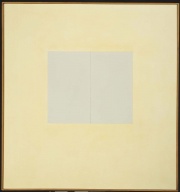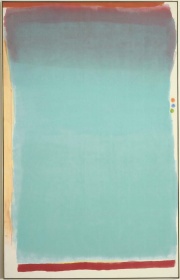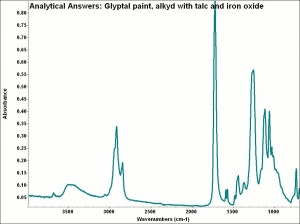Difference between revisions of "Alkyd resin"
| (One intermediate revision by one other user not shown) | |||
| Line 1: | Line 1: | ||
| − | [[File:1971.739-SC14634.jpg|thumb|]] | + | [[File:1971.739-SC14634.jpg|thumb|Alkyd painting<br>MFA# 1971.739]] |
== Description == | == Description == | ||
A thermoset polymer made by the esterification of a polybasic acid with a polyhydric alcohol ([[glycol|glycol]], [[glycerol|glycerol]], etc.). Alkyds were first synthesized in 1901 by J.Smith and later patented by General Electric in 1914. The first commerciallized alkyd paint was Glyptal made by GE in 1926. As paints, alkyds are commonly combined with oils ([[safflower%20oil|safflower]], [[soybean%20oil|soybean]], [[linseed%20oil|linseed]], etc.) to form durable, resistant, nonyellowing paints. Oil-modified alkyds made with small amounts of added oil (30-45%) are called short-oil alkyds and are commonly used in baked enamel finishes on metal appliances and automobiles. Alkyds modified with greater amounts of oil (56-70%), called long-oil alkyds, have been used as house paints, artist paints (Griffin), and varnishes. They have good color retention and drying speeds that are faster than oil paints. In addition, alkyd coatings and paints produce a glossy, hard, tough, and durable finish. They do, however, have a tendency to drip and wrinkle in thick areas. The first molded alkyd resins were produced in 1948. The thermosetting resin has been used to make make car parts, electric switches, engine insulators, electronic components, and television parts. | A thermoset polymer made by the esterification of a polybasic acid with a polyhydric alcohol ([[glycol|glycol]], [[glycerol|glycerol]], etc.). Alkyds were first synthesized in 1901 by J.Smith and later patented by General Electric in 1914. The first commerciallized alkyd paint was Glyptal made by GE in 1926. As paints, alkyds are commonly combined with oils ([[safflower%20oil|safflower]], [[soybean%20oil|soybean]], [[linseed%20oil|linseed]], etc.) to form durable, resistant, nonyellowing paints. Oil-modified alkyds made with small amounts of added oil (30-45%) are called short-oil alkyds and are commonly used in baked enamel finishes on metal appliances and automobiles. Alkyds modified with greater amounts of oil (56-70%), called long-oil alkyds, have been used as house paints, artist paints (Griffin), and varnishes. They have good color retention and drying speeds that are faster than oil paints. In addition, alkyd coatings and paints produce a glossy, hard, tough, and durable finish. They do, however, have a tendency to drip and wrinkle in thick areas. The first molded alkyd resins were produced in 1948. The thermosetting resin has been used to make make car parts, electric switches, engine insulators, electronic components, and television parts. | ||
| − | + | [[File:1977.617-SC16527.jpg|thumb|Alkyd and crayon<br>MFA# 1977.617]] | |
| − | [[File:1977.617-SC16527.jpg|thumb|]] | ||
== Synonyms and Related Terms == | == Synonyms and Related Terms == | ||
| Line 14: | Line 13: | ||
[[[SliderGallery rightalign|aaiGLYPTAL.jpg~FTIR]]] | [[[SliderGallery rightalign|aaiGLYPTAL.jpg~FTIR]]] | ||
| − | == | + | ==Resources and Citations== |
| − | |||
| − | |||
| − | |||
| − | |||
| − | + | * Thomas J.S. Learner, Analysis of Modern Paints, Getty Conservation Institute, Los Angeles, 2004. | |
| − | + | * H. Standeven, "Problems associated with the use of gloss house-hold paints by 20th century artists" V&A Conservation Journal, Summer 2003, number 44. [http://www.vam.ac.uk/res_cons/conservation/journal/number_44/problems-gloss-paints/ Link] | |
* G.S.Brady, ''Materials Handbook'', McGraw-Hill Book Co., New York, 1971 Comment: p. 26, 624 | * G.S.Brady, ''Materials Handbook'', McGraw-Hill Book Co., New York, 1971 Comment: p. 26, 624 | ||
| Line 42: | Line 37: | ||
* Theodore J. Reinhart, 'Glossary of Terms', ''Engineered Plastics'', ASM International, 1988 | * Theodore J. Reinhart, 'Glossary of Terms', ''Engineered Plastics'', ASM International, 1988 | ||
| − | * | + | * History of Plastics at www.nswpmith.com.au/historyofplastics.html : source of all dates in record |
| − | * | + | * Plastics Museum at http://www.sandretto.it/museo/inglese/eplasti.htm |
* Art and Architecture Thesaurus Online, http://www.getty.edu/research/tools/vocabulary/aat/, J. Paul Getty Trust, Los Angeles, 2000 | * Art and Architecture Thesaurus Online, http://www.getty.edu/research/tools/vocabulary/aat/, J. Paul Getty Trust, Los Angeles, 2000 | ||
Latest revision as of 09:46, 26 April 2022
Description
A thermoset polymer made by the esterification of a polybasic acid with a polyhydric alcohol (Glycol, Glycerol, etc.). Alkyds were first synthesized in 1901 by J.Smith and later patented by General Electric in 1914. The first commerciallized alkyd paint was Glyptal made by GE in 1926. As paints, alkyds are commonly combined with oils (safflower, soybean, linseed, etc.) to form durable, resistant, nonyellowing paints. Oil-modified alkyds made with small amounts of added oil (30-45%) are called short-oil alkyds and are commonly used in baked enamel finishes on metal appliances and automobiles. Alkyds modified with greater amounts of oil (56-70%), called long-oil alkyds, have been used as house paints, artist paints (Griffin), and varnishes. They have good color retention and drying speeds that are faster than oil paints. In addition, alkyd coatings and paints produce a glossy, hard, tough, and durable finish. They do, however, have a tendency to drip and wrinkle in thick areas. The first molded alkyd resins were produced in 1948. The thermosetting resin has been used to make make car parts, electric switches, engine insulators, electronic components, and television parts.
Synonyms and Related Terms
résine alkyde (Fr.); resina alquid (Esp.); resina gliceroftálica (Esp.); resina alchidica (It.); resina alquidica (Port.); glycerophthalic resin
Examples: Glyptal;Griffin [Winsor & Newton]; Galkyd Painting Medium [Gamblin];
Resources and Citations
- Thomas J.S. Learner, Analysis of Modern Paints, Getty Conservation Institute, Los Angeles, 2004.
- H. Standeven, "Problems associated with the use of gloss house-hold paints by 20th century artists" V&A Conservation Journal, Summer 2003, number 44. Link
- G.S.Brady, Materials Handbook, McGraw-Hill Book Co., New York, 1971 Comment: p. 26, 624
- R. J. Gettens, G.L. Stout, Painting Materials, A Short Encyclopaedia, Dover Publications, New York, 1966
- Ralph Mayer, A Dictionary of Art Terms and Techniques, Harper and Row Publishers, New York, 1969 (also 1945 printing)
- Reed Kay, The Painter's Guide To Studio Methods and Materials, Prentice-Hall, Inc., Englewood Cliffs, NJ, 1983
- Matte Paint: Its history and technology, analysis, properties and conservation treatment, Eric Hansen, Sue Walston, Mitchell Bishop (ed.), J. Paul Getty Trust, Los Angeles, Vol. 30 of AATA, 1993
- C.V.Horie, Materials for Conservation, Butterworth-Heineman, London, 1997
- Jo Crook, Tom Learner, Modern Paints, Watson-Guptill Publications, New York, 2000 Comment: date = 1927
- M.Phillips, 'A Survey of Paint Technology', Paint in America, R. Moss, ed., Preservation Press, New York, 1994
- Theodore J. Reinhart, 'Glossary of Terms', Engineered Plastics, ASM International, 1988
- History of Plastics at www.nswpmith.com.au/historyofplastics.html : source of all dates in record
- Plastics Museum at http://www.sandretto.it/museo/inglese/eplasti.htm
- Art and Architecture Thesaurus Online, http://www.getty.edu/research/tools/vocabulary/aat/, J. Paul Getty Trust, Los Angeles, 2000


